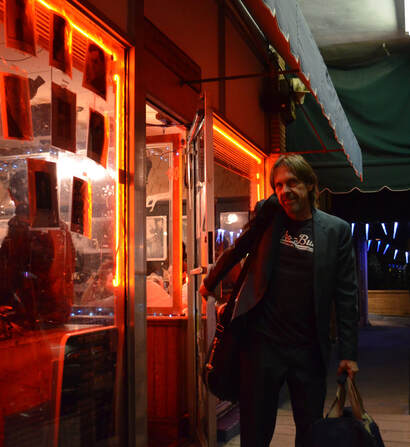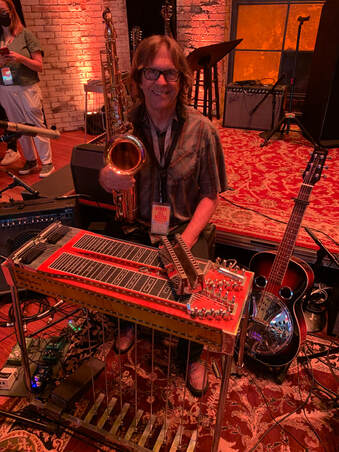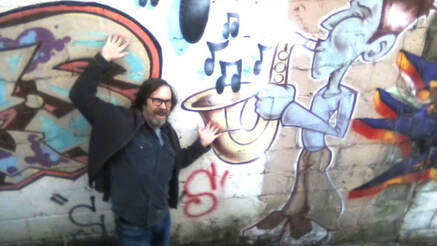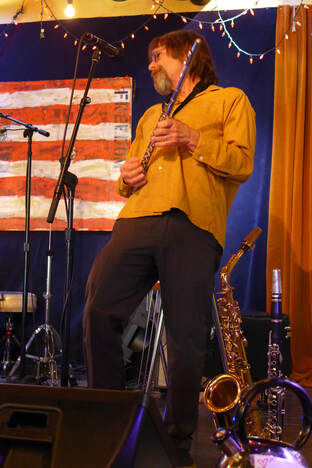
If you love what you do, it's not work - If this is true, then Jim Hoke's out of work. He's quite busy, however, being Nashville's premier studio musician on sax/woodwinds (the flute solo on Kacey Musgraves "There is a Light") harmonica (bass harp on Paul McCartney's Egypt Station album), pedal steel (Don Henley's Cass County album), a plethora of other color instruments, plus horn and string arrangements for a virtual who's who of every musical category.
|
The Bluebird Cafe, Nashville
|
Top artists in pop, country, Americana and other styles respect Jim for the amazing level of artistry he brings to everything he does. Nashville is a town of musical specialists and Jim is a rarity - a specialist on a baffling number of instruments, and he plays each one as if it's the only thing he does. - The Nashville Scene |
|
On sax, you hear the whole history of the saxophone coming through; soulful King Curtis or cool Stan Getz, melding into Jim's own contemporary style. When he plays blues/country harp, you hear Sonny Terry blues, electrified Paul Butterfield urban energy, and alot more. On chromatic harmonica, there's Stevie Wonder lyricism and Toots Thielemans innovation rolled into Jim's own style. Drawing so deeply from the well enables Jim to be the perfect stylist for any musical situation and this is the main reason for his success in the studio. |
The Americana Awards Show
|
|
The alley next to Bongo Java, Nashville
|
Jim Hoke: The Cream Interview
The champion sideman discusses (literally) dreaming up his album The Floating Zone and his residency at The 5 Spot If you've listened to an album recorded in Nashville any time in the last 30 years, there's a good chance you've heard the work of Jim Hoke. Known best for his saxophone chops, Hoke is a virtuosic multi-instrumentalist who has played sessions for artists like Dolly Parton, Paul McCartney, Emmylou Harris and Steve Earle, among many, many others. |
In November, Hoke released his solo album The Floating Zone. The collection of original material is built on melodies, lyrics and arrangements Hoke conceived while dreaming, hence the phantasmagoric title. Dreaminess aside, the songs are sturdy and thoughtful, showcasing longtime sideman Hoke as a vocalist for the first time in recorded form. It's worth noting, too, that Hoke plays every instrument on the album with the exception of strings and some guest contributions: Duane Eddy and John Oates also lend their talents to The Floating Zone. But it's ultimately Hoke's own vision and influences, including The Beatles, The Beach Boys and Eddy himself, that make for an intriguing album from a musical voice we're fortunate to finally hear so much more directly.
He’s been playing at The 5 Spot, where he's playing material from The Floating Zone and also entertaining requests for obscure Beatles tunes — a “stump-the-band” type scenario. Below, the Scene catches up with Hoke to chat about The Floating Zone, working with Eddy and Oates and how he manages to remember his dreams:
I’ve really been enjoying the album, and especially love the concept of writing songs derived from dreams. What was behind your decision to plot the album that way?
All my life, that’s something that's happened once in a while. I’ve never really been a writer as my main thing, although I’ve written a lot of instrumentals and I’ve had jazz groups in the past. Sometimes I wake up and there’s a big chunk of a song, enough that I can sort of round it out and finish it. It seems in the last three years I’ve been getting them more and more. The one that really made me think I should make an album is the pretty one, the one my son [Austin Hoke] sings called, “If Things Don’t Ever Work Out.” When I got that one recorded I thought, “Hmm, this is pretty good. Maybe it’s time to make a whole album and hang an album on that concept.” So, I decided about two years ago and just started recording them on my home recording rig, playing most of the instruments myself.
As far as actually being able to capture the ideas, how did you do it? Did you keep a voice recorder by your bed, or do you just have an unusually good memory for dreams?
I go downstairs and grab a scrap piece of manuscript paper and write it out the old-fashioned way, with notes. I stumble around all bleary-eyed and in near-darkness I scribble out the notes. If there are lyrics, I’ll write them, too. I usually hear the chords in my head that I want to accompany a melody so I write them above, and a little note to myself about the style or the feel. I’ll namecheck another record and say, “Like ‘Sexy Sadie,’ or groove like ‘Good Vibrations’,” just so I’ll remember, because when I go back to sleep it’s going to be gone. …
Another thing I imagine folks are excited about with this album is getting the opportunity to spend some time listening to you sing. What was that like for you, getting to put more of a focus on your vocals?
Actually, that was a big challenge because I haven’t sang in public or recorded myself much over the years. A long time ago I used to sing folk songs in coffeehouses, but that was several chapters ago. Rediscovering my voice was actually exciting for me. Obviously, I have a limited instrument, but so do a lot of other character singers out there who don’t have what you would call “a naturally good voice.”
— I’m just putting it out there and hoping it sounds real. What do you think of the singing?
Well I was about to bring up how much I liked the a cappella track with John Oates, “Zero Gravity.” It has all those really cool, layered vocals that you guys did. It really stuck with me.
I like singing backgrounds and putting the parts together and stacking all my voices. John came over and I had already demoed the parts I wanted him to do, singing them myself, then he listened to the idea and we put his three parts on there one at a time and then I added my lead.
You strike me as someone who always has a lot of irons in the fire. What else are you working on these days that has you feeling excited?
I’m always looking for a chance to get the pedal steel out there. I’ve taken that up more recently in my life and that’s another thing that excites me in music at the moment. I’ve been getting to play steel on a whole variety of stuff. Buddy Miller has used me on some of his productions and my son Austin has a band and I play with him. When I’m not doing this new band and playing the new record, I'm waiting to see what's going to come in this week. Nashville has every kind of music going on, and it keeps things really fresh.
- Brittney McKenna - THE NASHVILLE SCENE
He’s been playing at The 5 Spot, where he's playing material from The Floating Zone and also entertaining requests for obscure Beatles tunes — a “stump-the-band” type scenario. Below, the Scene catches up with Hoke to chat about The Floating Zone, working with Eddy and Oates and how he manages to remember his dreams:
I’ve really been enjoying the album, and especially love the concept of writing songs derived from dreams. What was behind your decision to plot the album that way?
All my life, that’s something that's happened once in a while. I’ve never really been a writer as my main thing, although I’ve written a lot of instrumentals and I’ve had jazz groups in the past. Sometimes I wake up and there’s a big chunk of a song, enough that I can sort of round it out and finish it. It seems in the last three years I’ve been getting them more and more. The one that really made me think I should make an album is the pretty one, the one my son [Austin Hoke] sings called, “If Things Don’t Ever Work Out.” When I got that one recorded I thought, “Hmm, this is pretty good. Maybe it’s time to make a whole album and hang an album on that concept.” So, I decided about two years ago and just started recording them on my home recording rig, playing most of the instruments myself.
As far as actually being able to capture the ideas, how did you do it? Did you keep a voice recorder by your bed, or do you just have an unusually good memory for dreams?
I go downstairs and grab a scrap piece of manuscript paper and write it out the old-fashioned way, with notes. I stumble around all bleary-eyed and in near-darkness I scribble out the notes. If there are lyrics, I’ll write them, too. I usually hear the chords in my head that I want to accompany a melody so I write them above, and a little note to myself about the style or the feel. I’ll namecheck another record and say, “Like ‘Sexy Sadie,’ or groove like ‘Good Vibrations’,” just so I’ll remember, because when I go back to sleep it’s going to be gone. …
Another thing I imagine folks are excited about with this album is getting the opportunity to spend some time listening to you sing. What was that like for you, getting to put more of a focus on your vocals?
Actually, that was a big challenge because I haven’t sang in public or recorded myself much over the years. A long time ago I used to sing folk songs in coffeehouses, but that was several chapters ago. Rediscovering my voice was actually exciting for me. Obviously, I have a limited instrument, but so do a lot of other character singers out there who don’t have what you would call “a naturally good voice.”
— I’m just putting it out there and hoping it sounds real. What do you think of the singing?
Well I was about to bring up how much I liked the a cappella track with John Oates, “Zero Gravity.” It has all those really cool, layered vocals that you guys did. It really stuck with me.
I like singing backgrounds and putting the parts together and stacking all my voices. John came over and I had already demoed the parts I wanted him to do, singing them myself, then he listened to the idea and we put his three parts on there one at a time and then I added my lead.
You strike me as someone who always has a lot of irons in the fire. What else are you working on these days that has you feeling excited?
I’m always looking for a chance to get the pedal steel out there. I’ve taken that up more recently in my life and that’s another thing that excites me in music at the moment. I’ve been getting to play steel on a whole variety of stuff. Buddy Miller has used me on some of his productions and my son Austin has a band and I play with him. When I’m not doing this new band and playing the new record, I'm waiting to see what's going to come in this week. Nashville has every kind of music going on, and it keeps things really fresh.
- Brittney McKenna - THE NASHVILLE SCENE
"I Can’t Stop Thinking About the Flute Solo on Star Crossed"
|
"The upbeat, disco-infused track is enough on it's own—but "there is a light" also offers something that has, to my knowledge, never been offered in a country song before. Is that? Yes it is. That's a country music flute solo, provided by flautist Jim Hoke... Not only does it mark a well-deserved breath of fresh air, punctuating an emotional album with unbridled joy, but it also invites the listener to find that happiness along with her. It's as unexpected and visceral as the rest of the album... I hope there's a flute solo waiting in the wings for me, too, because this woodwind fan found it delightful as hell..." - Justin Kirkland - ESQUIRE MAGAZINE |
The original Family Wash, Nashville
|



